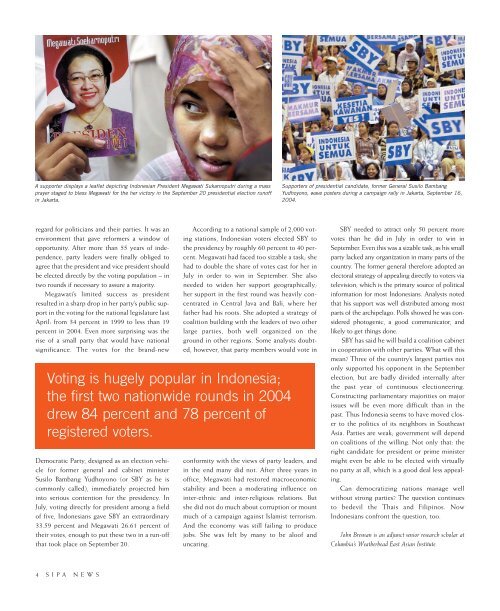for pdf - School of International and Public Affairs - Columbia ...
for pdf - School of International and Public Affairs - Columbia ...
for pdf - School of International and Public Affairs - Columbia ...
- No tags were found...
Create successful ePaper yourself
Turn your PDF publications into a flip-book with our unique Google optimized e-Paper software.
<strong>for</strong> <strong>pdf</strong> 2/10/05 1:40 PM Page 4A supporter displays a leaflet depicting Indonesian President Megawati Sukarnoputri during a massprayer staged to bless Megawati <strong>for</strong> the her victory in the September 20 presidential election run<strong>of</strong>fin Jakarta.Supporters <strong>of</strong> presidential c<strong>and</strong>idate, <strong>for</strong>mer General Susilo BambangYudhoyono, wave posters during a campaign rally in Jakarta, September 16,2004.regard <strong>for</strong> politicians <strong>and</strong> their parties. It was anenvironment that gave re<strong>for</strong>mers a window <strong>of</strong>opportunity. After more than 55 years <strong>of</strong> independence,party leaders were finally obliged toagree that the president <strong>and</strong> vice president shouldbe elected directly by the voting population – intwo rounds if necessary to assure a majority.Megawati’s limited success as presidentresulted in a sharp drop in her party’s public supportin the voting <strong>for</strong> the national legislature lastApril: from 34 percent in 1999 to less than 19percent in 2004. Even more surprising was therise <strong>of</strong> a small party that would have nationalsignificance. The votes <strong>for</strong> the br<strong>and</strong>-newDemocratic Party, designed as an election vehicle<strong>for</strong> <strong>for</strong>mer general <strong>and</strong> cabinet ministerSusilo Bambang Yudhoyono (or SBY as he iscommonly called), immediately projected himinto serious contention <strong>for</strong> the presidency. InJuly, voting directly <strong>for</strong> president among a field<strong>of</strong> five, Indonesians gave SBY an extraordinary33.59 percent <strong>and</strong> Megawati 26.61 percent <strong>of</strong>their votes, enough to put these two in a run-<strong>of</strong>fthat took place on September 20.According to a national sample <strong>of</strong> 2,000 votingstations, Indonesian voters elected SBY tothe presidency by roughly 60 percent to 40 percent.Megawati had faced too sizable a task; shehad to double the share <strong>of</strong> votes cast <strong>for</strong> her inJuly in order to win in September. She alsoneeded to widen her support geographically;her support in the first round was heavily concentratedin Central Java <strong>and</strong> Bali, where herfather had his roots. She adopted a strategy <strong>of</strong>coalition building with the leaders <strong>of</strong> two otherlarge parties, both well organized on theground in other regions. Some analysts doubted,however, that party members would vote inVoting is hugely popular in Indonesia;the first two nationwide rounds in 2004drew 84 percent <strong>and</strong> 78 percent <strong>of</strong>registered voters.con<strong>for</strong>mity with the views <strong>of</strong> party leaders, <strong>and</strong>in the end many did not. After three years in<strong>of</strong>fice, Megawati had restored macroeconomicstability <strong>and</strong> been a moderating influence oninter-ethnic <strong>and</strong> inter-religious relations. Butshe did not do much about corruption or mountmuch <strong>of</strong> a campaign against Islamist terrorism.And the economy was still failing to producejobs. She was felt by many to be alo<strong>of</strong> <strong>and</strong>uncaring.SBY needed to attract only 50 percent morevotes than he did in July in order to win inSeptember. Even this was a sizable task, as his smallparty lacked any organization in many parts <strong>of</strong> thecountry. The <strong>for</strong>mer general there<strong>for</strong>e adopted anelectoral strategy <strong>of</strong> appealing directly to voters viatelevision, which is the primary source <strong>of</strong> politicalin<strong>for</strong>mation <strong>for</strong> most Indonesians. Analysts notedthat his support was well distributed among mostparts <strong>of</strong> the archipelago. Polls showed he was consideredphotogenic, a good communicator, <strong>and</strong>likely to get things done.SBY has said he will build a coalition cabinetin cooperation with other parties. What will thismean? Three <strong>of</strong> the country’s largest parties notonly supported his opponent in the Septemberelection, but are badly divided internally afterthe past year <strong>of</strong> continuous electioneering.Constructing parliamentary majorities on majorissues will be even more difficult than in thepast. Thus Indonesia seems to have moved closerto the politics <strong>of</strong> its neighbors in SoutheastAsia. Parties are weak; government will dependon coalitions <strong>of</strong> the willing. Not only that: theright c<strong>and</strong>idate <strong>for</strong> president or prime ministermight even be able to be elected with virtuallyno party at all, which is a good deal less appealing.Can democratizing nations manage wellwithout strong parties? The question continuesto bedevil the Thais <strong>and</strong> Filipinos. NowIndonesians confront the question, too.John Bresnan is an adjunct senior research scholar at<strong>Columbia</strong>’s Weatherhead East Asian Institute.4 SIPA NEWS
















